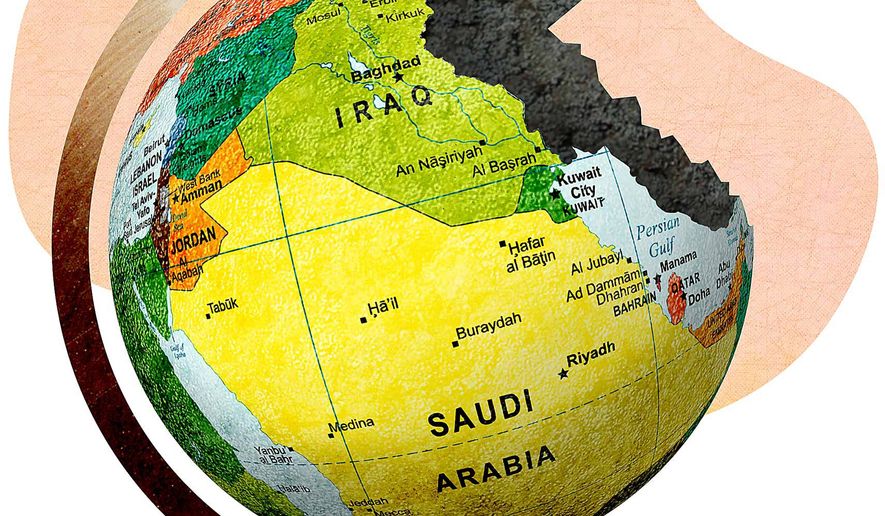OPINION:
The Trump administration is quietly pushing ahead with a plan for a new security and political alliance with six Gulf Arab states, Egypt and Jordan, in part to counter Iran’s expansion in the Middle East. The plan, which some in the White House and Middle East are calling an “Arab NATO” of Sunni Muslim allies can clearly be seen as one way to counter expansionism by Shi’ite Iran and referred to as the Middle East Strategic Alliance (MESA).
At a time when many are rethinking the utility of alliances such as NATO, this one could be a highly useful in dealing with the very real and immediate problems posed by Iran. Hopefully, it will be a subject for a summit provisionally scheduled for Washington in October.
Ideas for a Sunni-centric alliance in the Middle East are not new and the authors have suggested them several times in the past, including an arrangement with the Saudis, Jordanians, Turks and others supporting a moderate and tolerant Sunni leadership which would reduce the burgeoning and dangerous influence of Iran in the region — a common concern of all responsible nations there. Previously neither the United States nor the regional states that were potential targets of Iran felt any urgency to move ahead on this concept. As clearly seen in Syria, Yemen and elsewhere now time have changed.
The MESA is a concept whose time has come.
In theory the concept of a political and military coalition of moderate Sunni states — with U.S. support and participation — could help to offset the increasing belligerence of Iran, a fanatical regime and major supporter of terrorism that regularly threatens to blockade oil exports from the region, and a regime which will more than likely continue its covert nuclear weapons program despite any promises made in the negotiation of the ill-fated “nuclear deal” recently scrapped by President Trump.
At the same time there are a number of practical considerations posed by such an alliance, or “regional organization” in U.N. parlance? In terms of cost, this will not be another situation like NATO where the United States will bear the lion’s share of the burden. Exactly who pays and how much needs to be established at the outset. Nations like Saudi Arabia and the Gulf states are still awash in cash from oil exports and can well-afford to shoulder the burden. Jordan and some others lack great wealth from oil revenue and this needs to be part of the equation.
Beyond cost, there needs to be serious thought given to the nature and extent of the commitments. Would an attack on one alliance member be seen as an attack on all such as in NATO? It is also the case that NATO was formed at a time when the great fear was the threat of a large-scale attack by the Soviet Union and Warsaw Pact forces. Far less attention was given to covert operations, use of terrorist proxies and other forms of regional expansionism such as Iran is fomenting in the Middle East today. The form and nature of the alliance push-back on Iran short of formal warfare will be a key concern.
Perhaps most important — because it’s the Middle East — is what about Israel and the dynamics associated with the “Israeli relationship” — if any — with an organization such as MESA? Any serious security alliance involving the United States in the Middle East without full Israel involvement makes little sense, even though Israel is not a Sunni Muslim nation. Israel is not only the strongest ally the United States has in the region, it is the most significant military power in the Middle East.
Increasingly Sunni Muslim nations like Saudi Arabia have grown closer to Israel when looking seriously at their own security problems and the threat posed by Iran. The time has come for them to “bite the bullet” and joint the fold in facing the growing Iranian threat. The time for the Saudis playing both sides in this regional game is over and will need to deal openly with Israel in the MESA if the alliance is to have any real credibility.
For its part, Israel is currently coping with the major security problems posed by Iranian forces and missiles in Syria which are far more than an idle threat. In the near term, they are looking to Russia, the United States and even the Assad government in Syria for a workable solution but would be well served by a broader regional alliance to cope with Iran over the longer term and include the set of Sunni Muslim states in the process.
In sum, how all of this ultimately sorts out is going to require a great deal of thought and discussion on the part of the regional states with strong support from the Trump administration. We have an administration clearly focused on regional realities and the ongoing threats posed by Iran and willing to foster a new alliance such as MESA to meet this challenge.
• Daniel Gallington and Abraham Wagner served in senior national security positions.




Please read our comment policy before commenting.